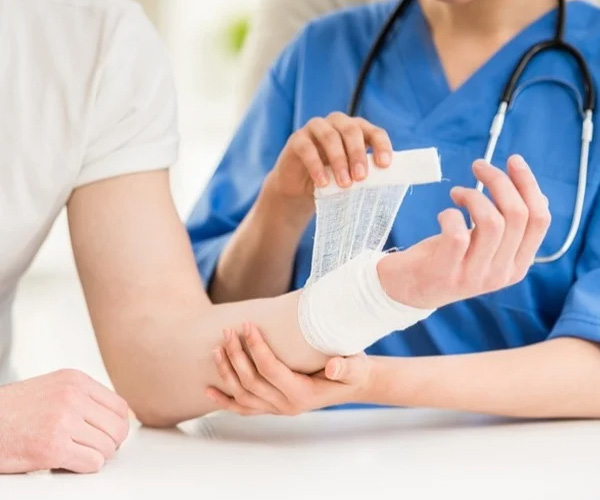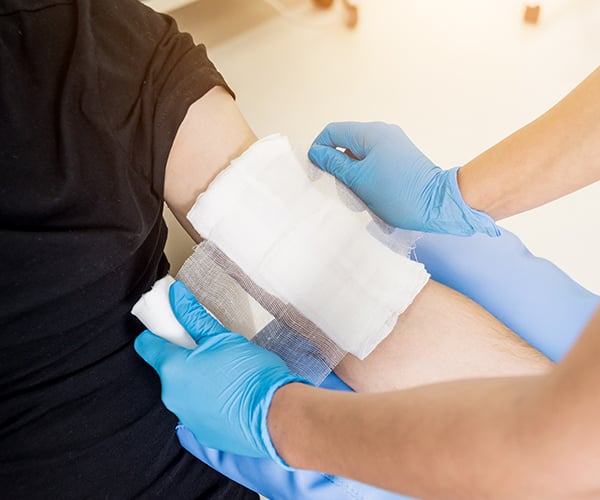Hyperbaric Oxygen Therapy for Wound Healing
Types of Wounds HBOT Treats
Hyperbaric Oxygen Therapy addresses wound healing at a deep cellular level, so it can be used to treat a wide range of wounds, burns, and other injuries and health complications.
Diabetic Foot Ulcer
The use of Hyperbaric Oxygen Therapy to treat diabetic lower extremity wounds, commonly referred to as diabetic foot ulcers, reduces amputation rates and can dramatically improve quality of life. HBOT does this by:
- Fighting infection
- Creating new blood vessels
- Accelerating wound healing
- Reducing inflammation
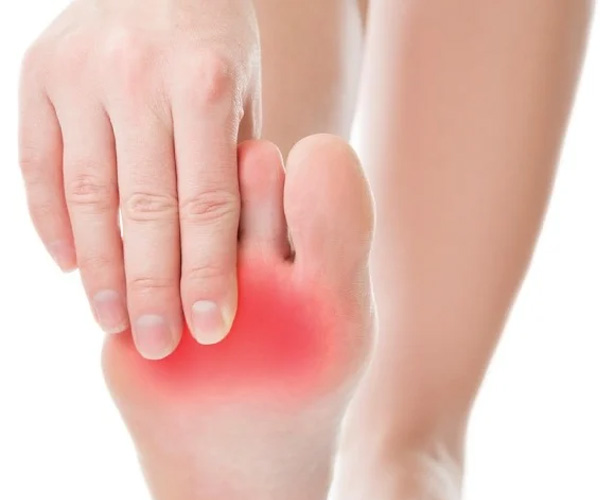

Radiation Tissue Damage
Hyperbaric oxygen therapy helps regenerate blood cells - process called angiogenesis, increase stem cells and accelerate healing after radiation in the following regions/areas:
- Bladder – following radiation from bladder or prostate cancer. Symptoms include urine frequency, pain, burning or bleeding.
- Breast – following radiation after a Masectomy or for breast cancer.
- Head, Neck & Jaw – leading to dental complications or jawbone problems and difficulty swallowing or moving the neck
- Bowel complications or bleeding after colon cancer radiation
- Neurological changes after radiation therapy for brain cancer
Failed Flaps & Grafts
To be successful, both skin grafts and flaps need a healthy, oxygenated transplant site. Hyperbaric Oxygen Therapy is used to prepare the wound site before the transplant and to promote healing after the skin graft or flap transplant by increasing the flow of oxygen-rich blood to the affected area.
- Prepares wound for transplant
- Increases healing
- Reduces recovery time
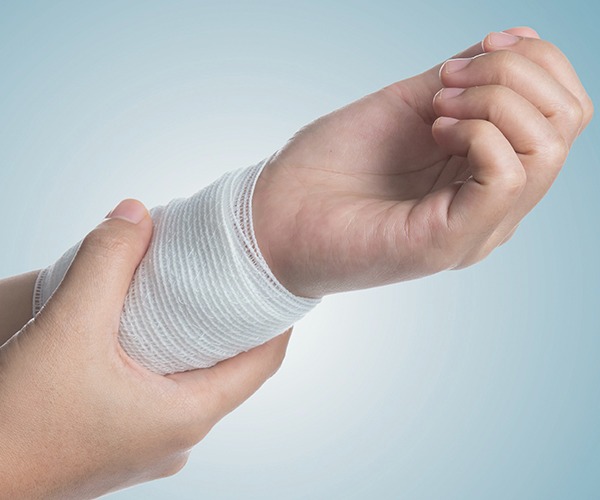
Soft Tissue Infections
Hyperbaric Oxygen Therapy can aid patients with necrotizing soft tissue infections by amplifying the effects of antibiotics, enhancing the body’s natural ability to fight off bacteria, and since some strains of bacteria are anaerobic, inhibit replication and directly kill the organism. HBOT helps by:
- Enhancing body’s natural defense mechanisms
- Boosting the effects of antibiotics
- Killing certain bacteria
- Improving healing
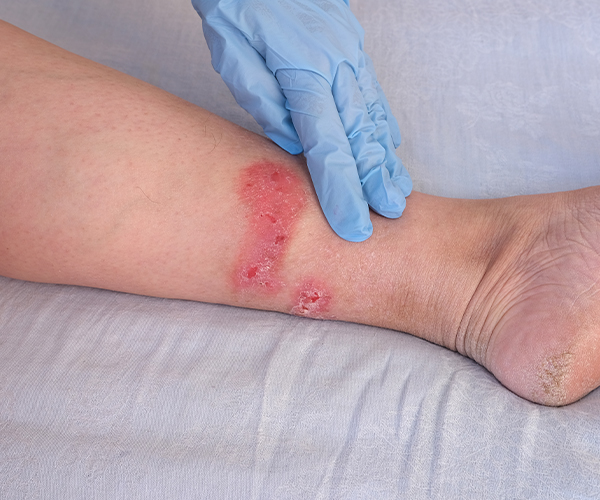
Surgical Prep, Recovery & Complications
All surgeries, even those performed to cure or improve medical conditions, result in wounds that the body will need to heal. HBOT is especially effective in complex surgical cases where there is a high risk of wound healing complications. HBOT:
- Reduces edema/inflammation
- Enhances oxygen availability to injured tissue
- Promotes fibroblast proliferation/collagen synthesis, decreasing fibrosis
- Reduces incidence of infection due to the enhancement of leukocyte oxidative killing
- Increases tensile strength of healed tissue
- Increases angiogenesis (creation of new blood vessels)

HBOT Benefits Non-Healing Wounds
Reduces Amputation Risk
A systematic review of 10 studies found that HBOT reduced the risk of major amputation by 76%.
Kills Anaerobic Bacteria
Anaerobic bacteria thrive in environments with low oxygen levels, such as deep wounds or infected tissues. HBOT can kill these bacteria, further supporting wound healing.
Reduces Wound Size
HBOT has been shown to be effective in reducing the size of a variety of chronic wounds, including diabetic foot ulcers, non-healing wounds, skin grafts and flaps, and more.Speeds Up Healing and Recovery
Studies have found that HBOT was associated with a 50% reduction in the time it takes for chronic wounds to close.
Get Started In Your Wound-Healing Recovery
Free 15 Min Info-Session
Speak with a Patient Care Coordinator to get all of your questions answered, see if you'd be a good fit for our wound-healing program and get pricing.
Begin your healing journey today.
SCHEDULE CONSULTATION Call Us: 516-762-8840Research & Studies
Hyperbaric Oxygen Therapy: Solution for Difficult to Heal Wounds – Systematic Review
Hyperbaric Oxygen Therapy for Wound Healing and Limb Salvage: a Systematic Review
Case Report: Hyperbaric Oxygen Therapy (HBOT) as Adjunctive Treatment for Pyoderma Gangrenosum
Hyperbaric Oxygen Therapy for Non-Healing Vasculitic Ulcers
Ischemic scleroderma wounds successfully treated with Hyperbaric Oxygen Therapy
More About Wound Healing
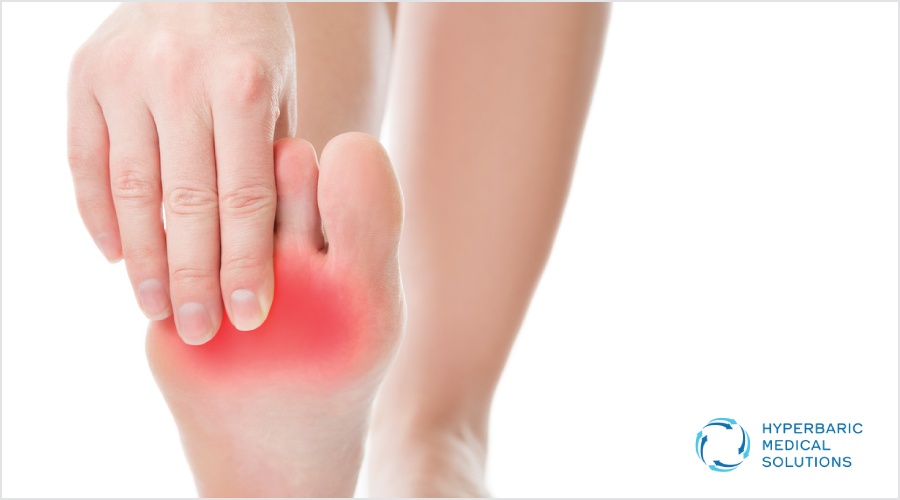
Hyperbaric Oxygen Therapy as a Diabetic Foot Ulcer Treatment
Hyperbaric oxygen therapy is a diabetic foot ulcer treatment approved by the FDA that aims to help heal these wounds with pure oxygen.
Read More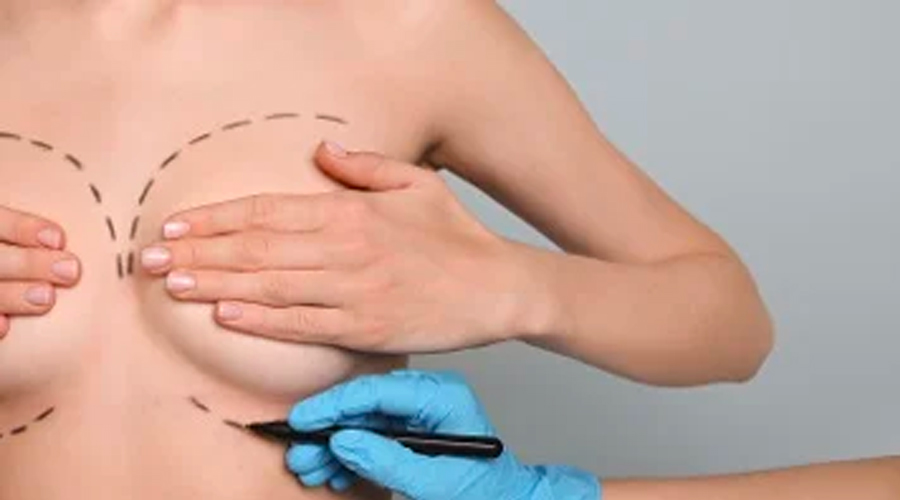
Use of Hyperbaric Oxygen Therapy for Compromised Skin Grafts and Flaps in Breast Reconstruction
Hyperbaric oxygen therapy can help salvage compromised skin grafts and tissue flaps during breast reconstructions to achieve full and healthy recovery.
Read More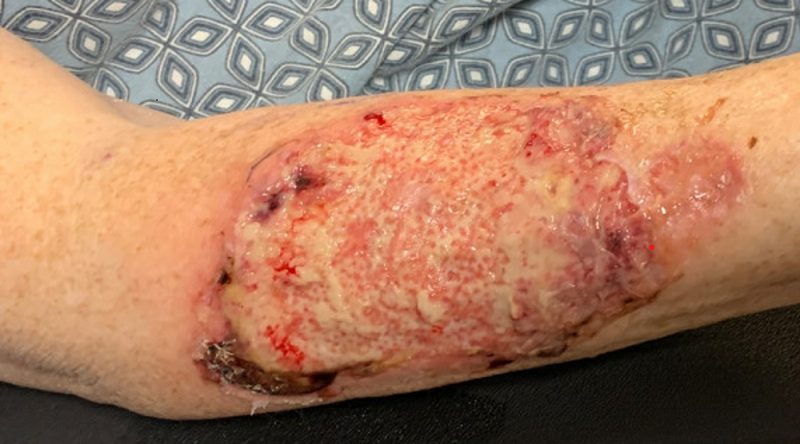
New Published Case Report: HBOT as treatment for Pyoderma Gangrenosum
Published case report published on patients who used HBOT for treatment of pyoderma gangrenosum, resulting with closure of wounds and reduction of pain.
Read More
Learn About Diabetic Foot Ulcers
The diabetic sores on the feet of those with this metabolic disease are foot ulcers that can become infected if not properly treated.
Read More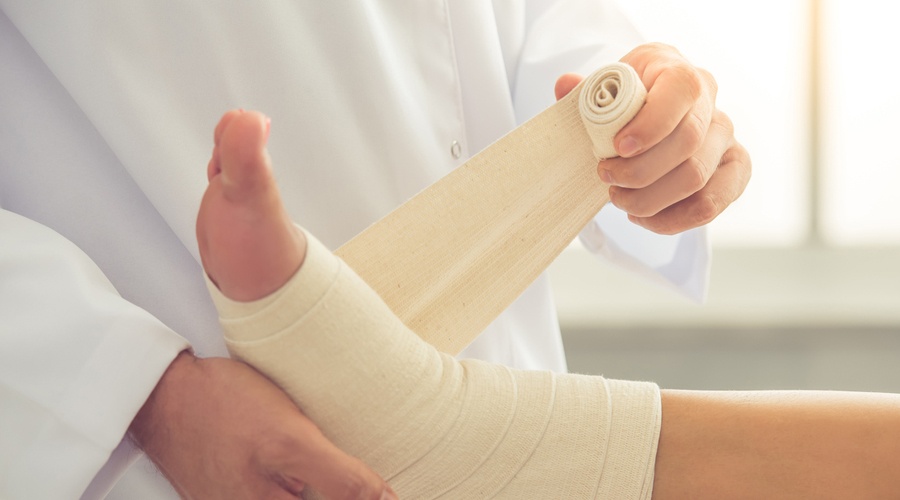
Tips for Diabetic Wound Care
Diabetic wound care tips include learning about hyperbaric oxygen therapy and watching for any signs of regression.
Read More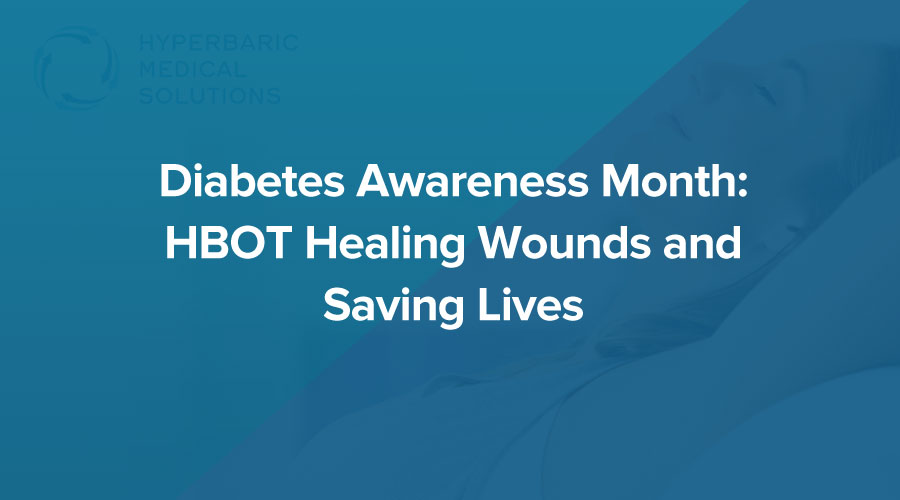
Diabetes Awareness Month: HBOT Healing Wounds and Saving Lives
Diabetes is a growing epidemic, creating non-healing wounds. Prevention is key, but risks of amputation remain. HBOT heals diabetic wounds & saves lives.
Read More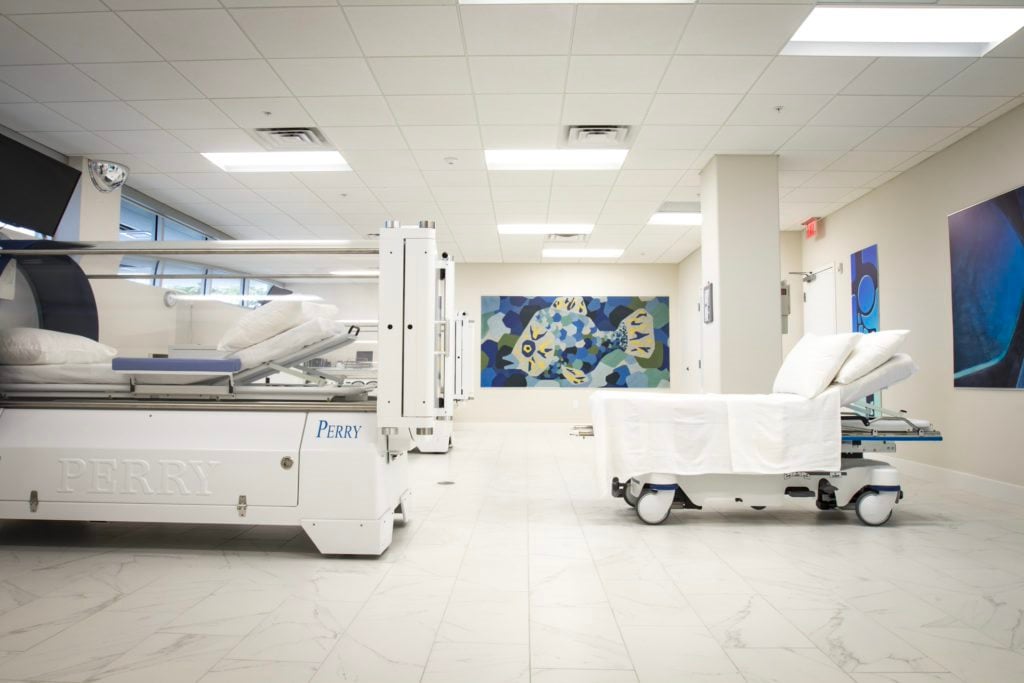
How Does Hyperbaric Oxygen Therapy Help With Wound Healing?
Learn how HBOT can heal wounds faster and naturally. From non-healing wounds, to diabetic foot uclers, post-surgical wounds, radiation damage and more.
Read More
Dr. Katz, Keynote Speaker at Yale New Haven Health's Symposium
HMS Medical Director, Dr. Katz, is the upcoming keynote speaker at Yale New Haven Health's Wound Science Symposium
Read More
Case Study: 'Tummy Tuck' Wound Healed with HBOT
Hyperbaric Oxygen Therapy helps a women with a failed flap and non-healing would following an abdominoplasty aka tummy tuck, a well-known plastic surgery.
Read More
Case Study: Patient Overcomes Severe COVID-19 Plus Osteomyelitis and Non-Healing Wound with HBOT
Hyperbaric Oxygen Therapy helps a patient suffering with Osteomyelitis and a non-healing, chronic wound that resulted from a long-term hospital stay from COVID-19.
Read More
Hyperbaric Oxygen Therapy as a Diabetic Foot Ulcer Treatment
Hyperbaric oxygen therapy is a diabetic foot ulcer treatment approved by the FDA that aims to help heal these wounds with pure oxygen.
Read More
Use of Hyperbaric Oxygen Therapy for Compromised Skin Grafts and Flaps in Breast Reconstruction
Hyperbaric oxygen therapy can help salvage compromised skin grafts and tissue flaps during breast reconstructions to achieve full and healthy recovery.
Read More
New Published Case Report: HBOT as treatment for Pyoderma Gangrenosum
Published case report published on patients who used HBOT for treatment of pyoderma gangrenosum, resulting with closure of wounds and reduction of pain.
Read More
Learn About Diabetic Foot Ulcers
The diabetic sores on the feet of those with this metabolic disease are foot ulcers that can become infected if not properly treated.
Read More
Tips for Diabetic Wound Care
Diabetic wound care tips include learning about hyperbaric oxygen therapy and watching for any signs of regression.
Read More
Diabetes Awareness Month: HBOT Healing Wounds and Saving Lives
Diabetes is a growing epidemic, creating non-healing wounds. Prevention is key, but risks of amputation remain. HBOT heals diabetic wounds & saves lives.
Read More
How Does Hyperbaric Oxygen Therapy Help With Wound Healing?
Learn how HBOT can heal wounds faster and naturally. From non-healing wounds, to diabetic foot uclers, post-surgical wounds, radiation damage and more.
Read More
Dr. Katz, Keynote Speaker at Yale New Haven Health's Symposium
HMS Medical Director, Dr. Katz, is the upcoming keynote speaker at Yale New Haven Health's Wound Science Symposium
Read More
Case Study: 'Tummy Tuck' Wound Healed with HBOT
Hyperbaric Oxygen Therapy helps a women with a failed flap and non-healing would following an abdominoplasty aka tummy tuck, a well-known plastic surgery.
Read More
Case Study: Patient Overcomes Severe COVID-19 Plus Osteomyelitis and Non-Healing Wound with HBOT
Hyperbaric Oxygen Therapy helps a patient suffering with Osteomyelitis and a non-healing, chronic wound that resulted from a long-term hospital stay from COVID-19.
Read More
Hyperbaric Oxygen Therapy as a Diabetic Foot Ulcer Treatment
Hyperbaric oxygen therapy is a diabetic foot ulcer treatment approved by the FDA that aims to help heal these wounds with pure oxygen.
Read More
Use of Hyperbaric Oxygen Therapy for Compromised Skin Grafts and Flaps in Breast Reconstruction
Hyperbaric oxygen therapy can help salvage compromised skin grafts and tissue flaps during breast reconstructions to achieve full and healthy recovery.
Read More
